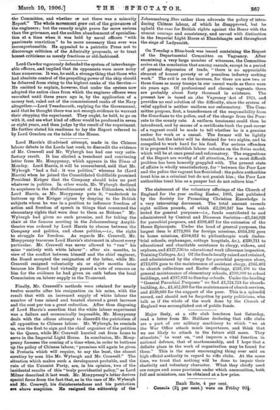Lord Harris's ill-advised attempt, made in the Chinese labour debate
in the Lords last week, to discredit the evidence of Mr. Creswell and Mr. Wybergh has had one very satis- factory result. It has elicited a trenchant and convincing letter from Mr. Monypenny, which appears in the Times of Monday. Lord Harris, it will be remembered, said that Mr. Wybergh "had a fad : it was politics," whereas he (Lord Harris) when he joined the Consolidated Goldfields promised President Kruger that the Company should take no part Whatever in politics. In other words, Mr. Wybergh declined to acquiesce in the disfranchisement of the Uitlimders, while Lord Harris, as Mr. Monypenny puts it, "undertook to buttress up the Kruger regime by denying to the British subjects whom he was in a position to influence freedom of action and freedom of speech in things that concerned the elementary rights that were dear to them as Britons." Mr. Wybergh had given no such promise, and for taking the chair at the famous meeting in the Johannesburg Amphi- theatre was ordered by Lord Harris to choose between the Qompany and politics, and chose polities,—i.e., the right to struggle for freedom. As regards Mr. Creswell, Mr. Monypenny traverses Lord Harris's statement in almost every particular. Mr. Creswell was never allowed to "run" his mine "entirely with white labour " : after six months, in view of the conflict between himself and the chief engineer, the Board accepted the resignation of the latter, while Mr. Creswell resigned voluntarily six or eight • months later because his Board had virtually passed a vote of censure on him for the evidence he had given on oath before the local Commission on labour supply in the Transvaal.










































 Previous page
Previous page